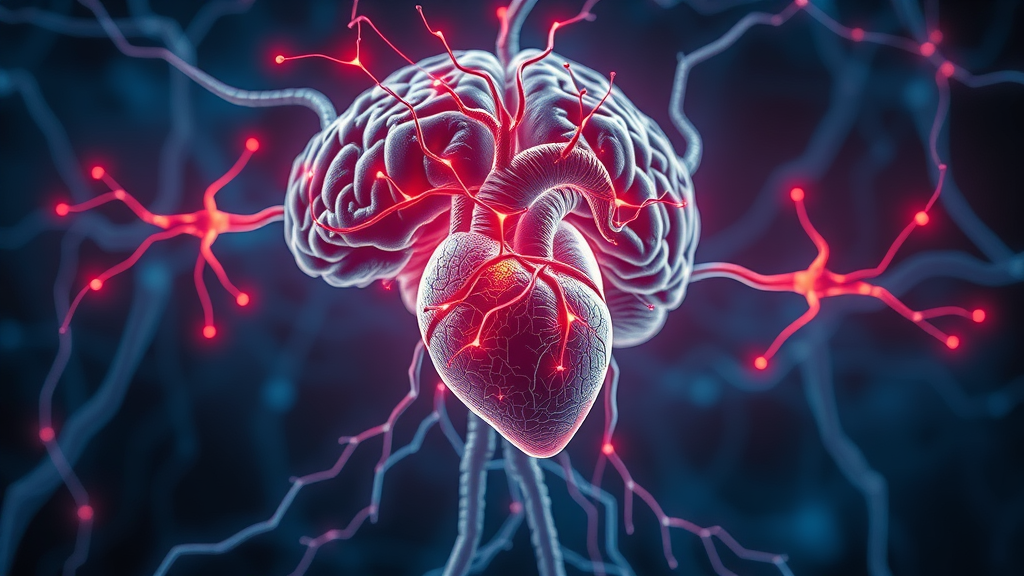"Nearly one in five adults living with chronic physical conditions also experience mental illness—yet this critical connection is frequently ignored."

Unpacking the Relationship Between Mental Health and Chronic Disease
The relationship between mental health and chronic disease remains one of the most under-discussed aspects of modern health care. While chronic physical conditions like diabetes, heart disease, and autoimmune disorders impact millions, it's rarely recognized that mental illnesses—such as depression and anxiety—often walk hand in hand with these medical conditions. Living with a chronic illness does not just challenge the body; it places immense strain on a person’s mental well-being. For many, the emotional and psychological toll is as severe as the physical symptoms, making it crucial to address both aspects together.
People with chronic diseases frequently report feelings of isolation, frustration, and sadness. At the same time, those with existing mental health issues may struggle more with medication adherence, healthy routines, and seeking appropriate medical advice. These intertwined struggles can create a vicious cycle, worsening outcomes for both physical health and psychological well-being. There’s mounting evidence that integrated, whole-person care leads to better quality of life —yet, health care systems and even family support structures often fail to make mental health a real priority alongside physical health. Recognizing the profound connection between mental health and chronic illness is the first step towards improving lives.
- What You’ll Discover in This Article
- The scientific and social reasons behind the link between mental health and chronic disease
- The impact of mental illness on chronic physical health—and vice versa
- Real-world examples, patient stories, and clinical insights
- Actionable strategies for patients, caregivers, and health professionals
Why Mental Health and Chronic Disease Deserve Equal Attention

Despite the overwhelming evidence, there remains a troubling gap in how we approach chronic physical conditions versus mental illnesses. When a patient is diagnosed with heart disease or diabetes, the spotlight is often on medication, lab tests, and lifestyle adjustments—while mental health takes a backseat. This bias neglects the reality that mental illnesses can directly influence chronic illness management, recovery, and prognosis. Not only do patients with untreated depression or anxiety have poorer health outcomes, but the absence of mental health support also places an extra burden on care providers and families. True health care must see the mind and body as inseparable , each with the power to impact the other.
The need for parity isn't just medical, it's also a social justice issue. People living with chronic diseases frequently contend with stigma, not just about their illness, but about mental health as well. This double barrier can prevent individuals from seeking help, voicing concerns, or adhering to their prescribed treatment plan. As research grows, the call for integrated health care—where primary care, mental health professionals, and specialists collaborate closely—becomes louder and more urgent.
Addressing both physical and mental health is essential for long-term wellness. For a closer look at how personal health choices and innovative recovery strategies can transform outcomes for those living with chronic conditions, explore this in-depth guide on recovering from asthma and making empowered health decisions .
Mental Illness and Chronic Physical Conditions: A Two-Way Street
"Managing a chronic illness without considering mental health is like fixing half of a broken bridge—it just won’t hold up in the long run."
- Bidirectional risk: how mental illnesses can worsen the progression of chronic diseases
- Chronic disease as a trigger or aggravator of mental health challenges
- The compounding toll on quality of life, productivity, and relationships
The link between mental health and chronic disease is fundamentally bidirectional. A mental illness can elevate the risk of developing a chronic physical condition—and, in turn, a chronic disease can trigger or worsen mental health challenges. For instance, someone struggling with major depression might find it harder to maintain a healthy diet, exercise, or consistently take their medications, which are all vital in managing conditions like diabetes or heart disease. Conversely, learning to live with a debilitating health problem such as rheumatoid arthritis can spark anxiety, mood swings, or even full-blown panic attacks.
Not addressing both sides of this equation can have devastating effects. As symptoms aggravate each other, patients often face declining quality of life , employment challenges, and strained relationships. These pressures go beyond the physical, seeping into every aspect of daily functioning. The role of caregivers, family members, and especially care providers becomes even more critical in identifying, treating, and supporting individuals caught in this two-way struggle.
Equally, loved ones may struggle to offer the right support, feeling ill-equipped to address the emotional side of chronic conditions. Without a coordinated, integrated care approach , efforts to manage either a mental illness or a chronic disease often fall short, reinforcing the cycle of suffering and lost potential.
The Science: Interactions Between Chronic Illness and Mental Health
| Chronic Physical Condition | Associated Mental Illness | Key Impact |
|---|---|---|
| Heart Disease | Depression, Anxiety | Increased risk of complications |
| Diabetes | Depression | Poor glycemic control |
| Autoimmune Disorders | Anxiety, Mood Disorders | Medication noncompliance |
| COPD | Depression | Reduced prognosis |

Decades of research illuminate the complex interactions between chronic illness and mental health. The body’s stress response, for example, is closely tied to the immune, cardiovascular, and endocrine systems. When a person endures long-term physical symptoms or a life-altering diagnosis, the resulting stress can disrupt brain chemistry, increasing vulnerability to conditions like depression and anxiety. Similarly, untreated mental illnesses have been shown to heighten inflammation, raise blood pressure, and interfere with the body's ability to heal—all of which complicate chronic disease management.
The table above highlights typical pairings of physical and mental health conditions, illustrating their joint impact. For instance, people with heart disease who also suffer from anxiety or depression are at greater risk for complications and poorer recovery. Those managing diabetes with co-occurring depression often struggle with blood sugar stability, while patients with autoimmune disorders face higher odds of both mood disturbances and medication noncompliance. By understanding these science-backed connections, health care teams can better design comprehensive care plans that address the full spectrum of patient needs.
It’s essential for health professionals —including primary care providers —to regularly screen for symptoms of mental illness in patients with chronic diseases. This proactive stance can ensure timely interventions, improved adherence to treatment plans, and ultimately better health outcomes. Integrated care models—where teams collaborate on both mental and physical health—are paving the way for whole-person wellness.
Physical Symptoms and Mental Health: How Stress Amplifies Pain
- Explore psychosomatic cycles in chronic diseases
- The role of stress management in health care and recovery

Chronic diseases are notorious for their ability to weave physical and emotional pain into a seemingly unbreakable cycle. A patient may experience real, tangible symptoms—joint pain, fatigue, digestive issues—yet underlying stress and anxiety can exacerbate these symptoms, making them harder to control. This is known as a psychosomatic cycle , where mental and physical health feed off each other. Not only does pain increase emotional distress, but heightened anxiety and depressive symptoms can also lower the pain threshold, intensifying the experience and complicating recovery.
Stress is not just a mental experience—it can trigger biological changes throughout the body, including increased inflammation, elevated cortisol levels, and disrupted sleep. These changes are especially harmful for people fighting chronic illness, as they may lead to flares or setbacks in physical health. Effective pain management is most successful when it includes stress reduction techniques like mindfulness, cognitive behavioral therapy, and support groups. By teaching patients how to identify and disrupt these cycles, health care providers can deliver far better results for both physical and mental healing.
Tackling stress head-on is an essential part of comprehensive chronic disease management. Health systems must prioritize psychological resilience by providing access to counseling, peer support, and evidence-based relaxation techniques. Only by seeing stress and pain as interconnected can we truly support people in reclaiming their quality of life.
Real Stories: Lived Experience With Chronic Physical and Mental Illness
"After my diabetes diagnosis, my anxiety skyrocketed—suddenly every meal was a source of worry. The emotional burden was just as hard as the physical one."—Patient Account

Behind the headlines and statistics are real people wrestling daily with chronic illnesses and mental health challenges. Many patients describe feeling overwhelmed when they first receive a chronic disease diagnosis. In those moments, fears about physical deterioration are often matched or even surpassed by emotional distress—worries about stigma, loss of independence, or financial security. Patient support groups and therapy circles provide a vital lifeline in this context. Sharing stories helps break down isolation, fosters empathy, and gives both patients and families the tools to adapt and thrive.
Health care professionals can gain enormous insight from these lived experiences. When patients are empowered to share openly about their struggles with both chronic disease and mental illness, care providers learn to see the whole person, not just the chart. Perhaps most importantly, these stories challenge stereotypes and push for more compassionate, personalized health care that honors the deep connections between mind and body.
Listening to patient voices is critical not only for individual healing but also for system-wide change. Patients and caregivers who advocate for better integration of physical and mental health services frequently drive improvements in care models, support resources, and public policy.
Navigating Health Care With Dual Diagnoses: Systemic Challenges
- Barriers to integrated care for mental illness and chronic illnesses
- Patient and caregiver voices: what health professionals can learn
- Stigma and communication breakdowns in health care settings

Unfortunately, many patients with both chronic illness and mental illness find themselves lost in the cracks between separate health systems. Barriers to integrated care are everywhere: insurance coverage that splits mental and physical health, confusing referral processes, and care providers who may not communicate effectively. This “silo effect” means patients must navigate multiple appointments, medication regimens, and diverse medical advice, often without support in connecting the dots between their symptoms. For people already managing fatigue, pain, or cognitive overload, these hurdles can sabotage recovery and lead to missed care opportunities.
Stigma remains a persistent and damaging obstacle. Some patients avoid sharing mental health concerns with their primary care provider, fearing dismissal or misunderstanding. Others encounter health care professionals who lack training in recognizing or treating co-occurring disorders. These communication breakdowns can delay diagnosis, lengthen suffering, and erode trust in the health care system overall. To change this, health systems must promote open dialogue , compassion, and continual education for all team members.
Caregivers—whether family or friends—play a vital advocacy role. Supporting someone with both a chronic disease and a mental illness often means coordinating appointments, clarifying medical advice, and offering emotional reassurance. Empowering caregivers and patients to speak up and participate fully in treatment planning is key to better outcomes.
Breaking the Cycle: Best Practices for Managing Mental Health and Chronic Disease
- Multidisciplinary care teams: why they matter
- Self-advocacy: tips for patients with chronic physical and mental illness
- Building emotional resilience in the face of ongoing health problems
- Promoting quality of life with meaningful connections and lifestyle adjustments

Evidence shows that patients benefit most when their care is coordinated across disciplines—when medical doctors, therapists, social workers, and even pharmacists work together. Multidisciplinary teams are crucial for helping patients create treatment plans that address both medical and psychological needs. Such teams not only diagnose mental illnesses early but also ensure that mental health is a part of every discussion regarding medication, lifestyle changes, and ongoing monitoring. This approach helps prevent gaps in care, minimizes medication conflicts, and makes it easier for patients to stay engaged and hopeful.
Self-advocacy can make a huge difference for people managing dual diagnoses. This means asking your health professional about mental health screenings, seeking out specialized support services, and refusing to let mental health concerns be dismissed. Patients and families should also learn to recognize early warning signs—both mental and physical—so that intervention happens quickly. Keeping a symptom diary, reaching out to peers in support networks, and sharing concerns with trusted care providers are all practical strategies.
Finally, never underestimate the power of emotional resilience. Building supportive relationships, connecting with community resources, and developing coping strategies like meditation or journaling can dramatically improve one's outlook. In many cases, making small lifestyle adjustments—such as regular physical activity, healthy sleep habits, and positive social interactions—can ease both physical symptoms and emotional distress, supporting a more hopeful, connected life.
People Also Ask: Mental Health and Chronic Disease
How are chronic disease and mental health related?
- Chronic diseases and mental health are tightly linked, each influencing the development, severity, and treatment outcomes of the other. Living with a chronic illness increases susceptibility to mental health challenges, while existing mental illnesses heighten the risk for developing chronic diseases or worsening their symptoms.
What is the most severe mental illness?
- The severity of mental illnesses can vary, but conditions like schizophrenia, severe bipolar disorder, and major depressive disorder are among the most debilitating and can significantly impact daily functioning, especially for those with unmanaged chronic physical conditions.
What is the hardest chronic illness to live with?
- There’s no single 'hardest' chronic illness, as the challenge is shaped by the condition’s symptoms, prognosis, available treatments, and its intersection with mental health. Diseases such as chronic pain syndromes, autoimmune diseases, and rare or misunderstood illnesses often come with heightened psychological burdens.
What is the intersection of chronic illness and mental health?
- The intersection refers to how chronic physical health problems and mental illnesses affect and perpetuate each other—revealing the need for whole-person, integrated health care approaches.
Frequently Asked Questions about Mental Health and Chronic Disease
- What lifestyle changes can boost both physical condition and mental well-being?
- When should someone seek help from a health professional?
- Are there community resources for people managing chronic illness and mental illnesses?
- How does quality of life change with dual management strategies?

Key Strategies: Taking Control of Mental Health and Chronic Disease
- Proactively screen for depression and anxiety in chronic physical conditions
- Create a daily self-care plan—address both physical and emotional needs
- Build a care network: health professionals, peers, support groups
- Set realistic health goals and celebrate small wins
- Learn to recognize early warning signs of both mental and physical symptoms
- Advocate for integrated health care from your providers
- Leverage digital health tools for tracking and support
Final Thoughts: Why Prioritizing Mental Health and Chronic Disease Together Matters
"True wellness comes from treating the mind and body as one. Ignoring mental health in the face of chronic disease only increases suffering—for everyone involved."
- Integrating care is not a luxury but a necessity for health and longevity
- Every patient story underscores the need for hope, advocacy, and support
Take proactive steps: make mental health screenings a regular part of chronic disease care, build integrated support networks, and never hesitate to advocate for your own whole-person wellness.
If you’re ready to take your journey to the next level, consider how your daily choices and innovative approaches can shape your path to recovery and resilience. Delving deeper into the stories of those who have transformed their lives through proactive health decisions can offer both inspiration and practical guidance. For a broader perspective on overcoming chronic conditions and embracing positive change, discover the empowering experiences and strategies shared in this comprehensive article on personal health transformation . Let these insights fuel your motivation to prioritize both mind and body, and explore new ways to thrive—no matter where you are on your wellness journey.
Hop On the Path to Better Living—Starting Now!
- Climb Aboard the Wellness Train! Ready to take control of your health—one smart step at a time? Explore more tips, tools, and real-life strategies to help you live better with chronic conditions. 👉 Join the Wellness Seekers today for exclusive guides, expert insights, and everyday solutions! Hop On the Train Now!
 Add Row
Add Row  Add
Add 




Write A Comment